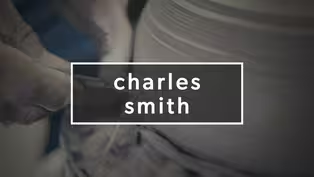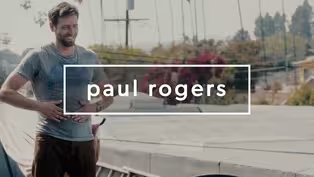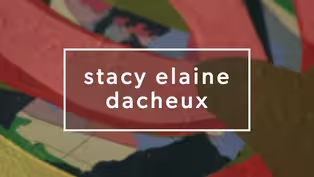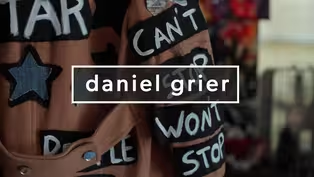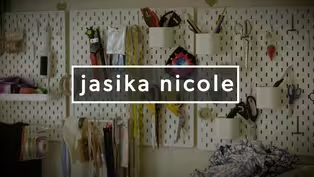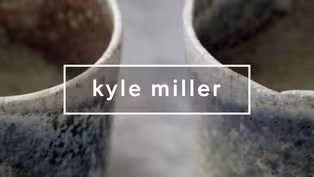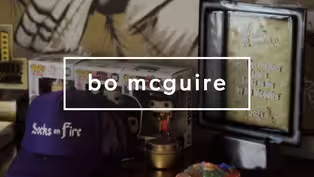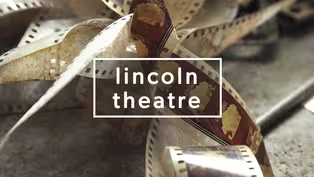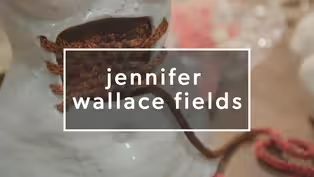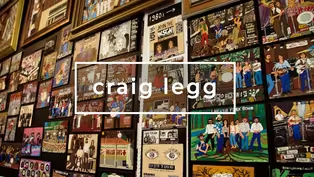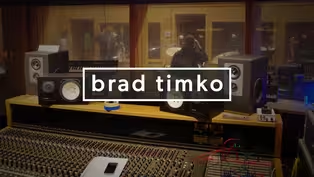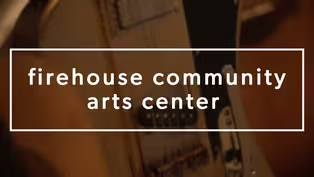Monograph
Lincoln Theatre
Clip: Season 5 | 6m 14sVideo has Closed Captions
The story of Bessemer's historically Black theater and efforts to restore it.
When actor André Holland learned the history of Bessemer's Lincoln Theatre - and that the dilapidated building was for sale - he decided to buy it and enlist his mother, Mary, to direct its restoration. Their dreams for the theater reflect their appreciation for the community they grew up in - and hopes that the theater can serve to reconnect people through the arts.
Problems playing video? | Closed Captioning Feedback
Problems playing video? | Closed Captioning Feedback
Monograph is a local public television program presented by APT
Monograph
Lincoln Theatre
Clip: Season 5 | 6m 14sVideo has Closed Captions
When actor André Holland learned the history of Bessemer's Lincoln Theatre - and that the dilapidated building was for sale - he decided to buy it and enlist his mother, Mary, to direct its restoration. Their dreams for the theater reflect their appreciation for the community they grew up in - and hopes that the theater can serve to reconnect people through the arts.
Problems playing video? | Closed Captioning Feedback
How to Watch Monograph
Monograph is available to stream on pbs.org and the free PBS App, available on iPhone, Apple TV, Android TV, Android smartphones, Amazon Fire TV, Amazon Fire Tablet, Roku, Samsung Smart TV, and Vizio.
Providing Support for PBS.org
Learn Moreabout PBS online sponsorship- I very often describe Bessemer as like an arts desert.
I know we talk about food desert but Bessemer is sort of an arts desert.
And I think if our young people were exposed to it more it would create more dialogue.
People would be able to communicate better and have discussions as opposed to so much conflict.
Back in the heyday, when I was a young girl downtown Bessemer and especially First Avenue was the Black entertainment district.
It was just very vibrant.
There were businesses that were Black owned.
Everything from beauty shops to barber shops, pool rooms, bake shops, delis, everything you needed entertainment wise and naturally the theater.
But as the industries declined, it's like people sort of moved away and the businesses went down, because people were not spending money.
They didn't have money to spend.
I think the Lincoln closed sometime in the 1980s.
- My mother is a very, very, very special person, and one of the things about her that was really unique growing up is that she read the newspaper cover to cover every single day.
That was something she always did.
One summer she read about Town and Gown theater and that they were doing like a summer drama program.
And you know, I wasn't interested at the time, but she said I was gonna do it.
And so I did.
- And so we would get in the car and drive downtown to Children's Theater for him to rehearse his one line, have a pickle.
- You know, after school every day we'd come to Town and Gown and do these little workshops and play games.
And ultimately we put on a show.
- And it just, just stuck with him.
And from there he has performed in movies.
He actually performed in "Selma".
He portrayed Ambassador Andrew Young.
He has performed "Othello" at the Globe in London.
And he was actually in "Moonlight" which won Best Picture.
- It's a shame, you know, it always felt a shame to me that I had to go outside of Bessemer, outside of the immediate community in order to access the arts.
So when I was growing up, I used to go, my dad and I would go get our haircut at this one shop every you know, every weekend, every Saturday.
And the shop itself was next to this kind of weird looking building that was always, you know, in like some state of like disrepair.
At one point you could look in the window and see that like there were all these things that were like shoved in there and that had been stored there, but it never occurred to me that it was anything other than just an old abandoned building.
And so he told me one day, he said, "Well, you know, that used to be a theater."
I was like, what you mean?
He's like, "Well, that was a movie theater.
"That's where we used to go and see movies.
"That was one of the only places that Black people "at the time could go to see movies."
The old movie reels were still there.
The old like signage, you know, "King Kong", you know, it was still there.
The projector were there, the seats were there.
You could see the kind of architecture of what used to be a really important place.
- And he came home and said, "I think I wanna buy that theater."
- And like, you know, as soon as I said I wanted to do this she was like, okay, let's figure it out.
So it was like, it was my idea, but she's like taking it and is like running with it.
And it's been amazing to see her spearhead this operation.
- He had the audacity to say to us once he had purchased it I really want you guys to get busy and get this place restored.
- And what was amazing is that as I started to talk to more and more people in the community, everybody had some memory of the Lincoln, everybody.
I mean, I would, people would say, "Oh, I went on my first date at the Lincoln."
"I remember, you know, what it looked like."
"I remember the movie that I saw."
- I remember coming there as a child and I've had people say, "Oh, I got my first kiss "over in that corner right over there."
- And just talking about the space, it's brought people together in like a really, really beautiful way.
And it's given space, I think for people to remember, you know, these important parts of their lives.
- Well, the arts meant so much to him growing up and it's something that he wants to expose more young people to.
- So my vision for the Lincoln is that it will be a single screen cinema that will primarily focus on films by makers of color, films that sort of explore the black diaspora.
I also wanted to have a component of education.
You know, like I said earlier, you know, it was difficult for me to find access to arts programming when I was young.
And I think that it's so important.
I mean, we obviously all know how little funding there is for arts and schools now.
And so I hope that the Lincoln can kind of help bridge that gap.
- Because we embarked upon this, I think there, it has spurred so much interest in the city.
There have been several people who've purchased buildings on the next block.
And so it's gonna have a domino effect.
I think it will rejuvenate the entire downtown area.
- I also see that theater as being a sort of gathering place for the community.
I feel like the connection between the elders and the young people has been severed in like a really kind of dangerous way.
And so for me, I feel like it's a, it also will be a community hub for people to get together and exchange information and exchange ideas and to exchange stories.
You know, I just think that the entire community, I think, I hope to create like an ecosystem of artists that'll sort of, you know, be birthed from this Lincoln project.
Video has Closed Captions
Clip: S5 | 6m 47s | Charles Smith shows you where to find the story hidden in plain sight. (6m 47s)
Video has Closed Captions
Clip: S5 | 6m 59s | A fisherman outside of Tuscaloosa is always finding new ways of doing things. (6m 59s)
Video has Closed Captions
Clip: S5 | 8m 19s | Chef and painter Roscoe Hall brings his life's experiences together to find his own voice. (8m 19s)
Video has Closed Captions
Clip: S5 | 6m 15s | Oscar-winner Paul Rogers on the value of collaboration and the core of outstanding work. (6m 15s)
Video has Closed Captions
Clip: S5 | 5m 9s | Painter and writer Stacy Elaine Dacheux (5m 9s)
Video has Closed Captions
Clip: S5 | 5m 45s | Birmingham youths transform old clothes into high fashion. (5m 45s)
Video has Closed Captions
Clip: S5 | 6m 54s | Birmingham, Alabama jewelry and clothing designer, Aaliyah Taylor (6m 54s)
Video has Closed Captions
Clip: S5 | 4m 34s | Highlighting the world of fashion in the Magic City with Daniel Grier (4m 34s)
Video has Closed Captions
Clip: S5 | 7m 45s | Actor and maker based in Los Angeles, Jasika Nicole (7m 45s)
Video has Closed Captions
Clip: S5 | 4m 43s | Fairhope, Alabama ceramics artist, Kyle Miller (4m 43s)
Video has Closed Captions
Clip: S5 | 5m | Poet and Filmmaker Bo McGuire from Gadsden, AL (5m)
Video has Closed Captions
Clip: S5 | 6m 14s | The story of Bessemer's historically Black theater and efforts to restore it. (6m 14s)
Video has Closed Captions
Clip: S5 | 5m 37s | tour spring creek film prop farm in montevallo alabama (5m 37s)
Video has Closed Captions
Clip: S5 | 7m | A studio visit with ceramic artist Jennifer Wallace Fields (7m)
Video has Closed Captions
Clip: S5 | 4m 50s | Craig Legg's Birmingham rock and roll retrospective. (4m 50s)
Video has Closed Captions
Clip: S5 | 4m 48s | Visit a historic recording studio near Muscle Shoals (4m 48s)
Firehouse Community Arts Center
Video has Closed Captions
Clip: S5 | 5m 54s | Firehouse Community Arts Center in Avondale, AL (5m 54s)
Video has Closed Captions
Clip: S5 | 4m 33s | Alabama based potter stays grounded to her Mexican roots through her craft (4m 33s)
Providing Support for PBS.org
Learn Moreabout PBS online sponsorshipSupport for PBS provided by:
Monograph is a local public television program presented by APT
